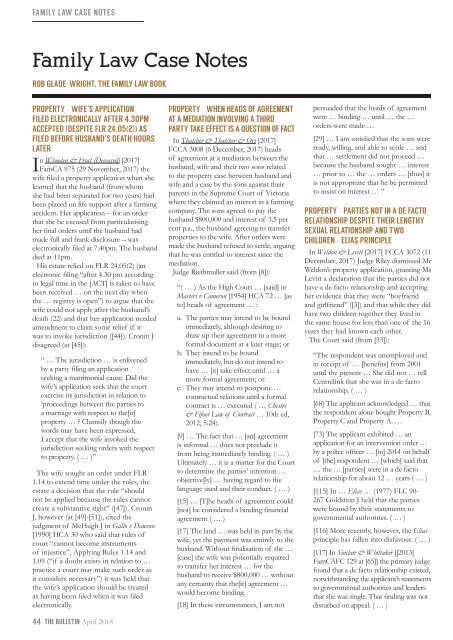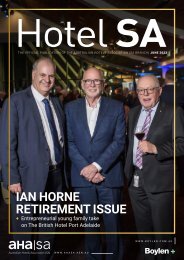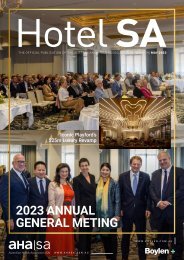LSB April 2018_Web
Create successful ePaper yourself
Turn your PDF publications into a flip-book with our unique Google optimized e-Paper software.
FAMILY LAW CASE NOTES<br />
Family Law Case Notes<br />
ROB GLADE-WRIGHT, THE FAMILY LAW BOOK<br />
PROPERTY – WIFE’S APPLICATION<br />
FILED ELECTRONICALLY AFTER 4.30PM<br />
ACCEPTED (DESPITE FLR 24.05(2)) AS<br />
FILED BEFORE HUSBAND’S DEATH HOURS<br />
LATER<br />
In Whooten & Frost (Deceased) [2017]<br />
FamCA 975 (29 November, 2017) the<br />
wife filed a property application when she<br />
learned that the husband (from whom<br />
she had been separated for two years) had<br />
been placed on life support after a farming<br />
accident. Her application – for an order<br />
that she be excused from particularising<br />
her final orders until the husband had<br />
made full and frank disclosure – was<br />
electronically filed at 7.40pm. The husband<br />
died at 11pm.<br />
His estate relied on FLR 24.05(2) (an<br />
electronic filing “after 4.30 pm according<br />
to legal time in the [ACT] is taken to have<br />
been received … on the next day when<br />
the … registry is open”) to argue that the<br />
wife could not apply after the husband’s<br />
death (22) and that her application needed<br />
amendment to claim some relief if it<br />
was to invoke jurisdiction ([44]). Cronin J<br />
disagreed (at [45]):<br />
“ … The jurisdiction … is enlivened<br />
by a party filing an application<br />
seeking a matrimonial cause. Did the<br />
wife’s application seek that the court<br />
exercise its jurisdiction in relation to<br />
‘proceedings between the parties to<br />
a marriage with respect to the[ir]<br />
property … ? Clumsily though the<br />
words may have been expressed,<br />
I accept that the wife invoked the<br />
jurisdiction seeking orders with respect<br />
to property. ( … )”<br />
The wife sought an order under FLR<br />
1.14 to extend time under the rules, the<br />
estate a decision that the rule “should<br />
not be applied because the rules cannot<br />
create a substantive right” ([47]). Cronin<br />
J, however (at [49]-[51]), cited the<br />
judgment of McHugh J in Gallo v Dawson<br />
[1990] HCA 30 who said that rules of<br />
court “cannot become instruments<br />
of injustice”. Applying Rules 1.14 and<br />
1.09 (“if a doubt exists in relation to …<br />
practice a court may make such order as<br />
it considers necessary”) it was held that<br />
the wife’s application should be treated<br />
as having been filed when it was filed<br />
electronically.<br />
44 THE BULLETIN <strong>April</strong> <strong>2018</strong><br />
PROPERTY – WHEN HEADS OF AGREEMENT<br />
AT A MEDIATION INVOLVING A THIRD<br />
PARTY TAKE EFFECT IS A QUESTION OF FACT<br />
In Thatcher & Thatcher & Ors [2017]<br />
FCCA 3008 (6 December, 2017) heads<br />
of agreement at a mediation between the<br />
husband, wife and their two sons related<br />
to the property case between husband and<br />
wife and a case by the sons against their<br />
parents in the Supreme Court of Victoria<br />
where they claimed an interest in a farming<br />
company. The sons agreed to pay the<br />
husband $800,000 and interest of 3.5 per<br />
cent p.a., the husband agreeing to transfer<br />
properties to the wife. After orders were<br />
made the husband refused to settle, arguing<br />
that he was entitled to interest since the<br />
mediation.<br />
Judge Riethmuller said (from [8]):<br />
“( … ) As the High Court … [said] in<br />
Masters v Cameron [1954] HCA 72 … [as<br />
to] heads of agreement … :<br />
a. The parties may intend to be bound<br />
immediately, although desiring to<br />
draw up their agreement in a more<br />
formal document at a later stage; or<br />
b. They intend to be bound<br />
immediately, but do not intend to<br />
have … [it] take effect until … a<br />
more formal agreement; or<br />
c. They may intend to postpone …<br />
contractual relations until a formal<br />
contract is … executed ( … Chesire<br />
& Fifoot Law of Contract … 10th ed,<br />
2012, 5.24).<br />
[9] … The fact that … [an] agreement<br />
is informal … does not preclude it<br />
from being immediately binding. ( … )<br />
Ultimately … it is a matter for the Court<br />
to determine the parties’ intention …<br />
objective[ly] … having regard to the<br />
language used and their conduct. ( … )<br />
[15] … [T]he heads of agreement could<br />
[not] be considered a binding financial<br />
agreement ( … )<br />
[17] The land … was held in part by the<br />
wife, yet the payment was entirely to the<br />
husband. Without finalisation of the …<br />
[case] the wife was potentially required<br />
to transfer her interest … for the<br />
husband to receive $800,000 … without<br />
any certainty that the[ir] agreement …<br />
would become binding.<br />
[18] In these circumstances, I am not<br />
persuaded that the heads of agreement<br />
were … binding … until … the …<br />
orders were made …<br />
[29] … I am satisfied that the sons were<br />
ready, willing, and able to settle … and<br />
that … settlement did not proceed …<br />
because the husband sought … interest<br />
… prior to … the … orders … [thus] it<br />
is not appropriate that he be permitted<br />
to insist on interest … ”<br />
PROPERTY – PARTIES NOT IN A DE FACTO<br />
RELATIONSHIP DESPITE THEIR LENGTHY<br />
SEXUAL RELATIONSHIP AND TWO<br />
CHILDREN – ELIAS PRINCIPLE<br />
In Weldon & Levitt [2017] FCCA 3072 (11<br />
December, 2017) Judge Riley dismissed Mr<br />
Weldon’s property application, granting Ms<br />
Levitt a declaration that the parties did not<br />
have a de facto relationship and accepting<br />
her evidence that they were “boyfriend<br />
and girlfriend” ([3]) and that while they did<br />
have two children together they lived in<br />
the same house for less than one of the 16<br />
years they had known each other.<br />
The Court said (from [33]):<br />
“The respondent was unemployed and<br />
in receipt of … [benefits] from 2001<br />
until the present … She did not … tell<br />
Centrelink that she was in a de facto<br />
relationship. ( … )<br />
[68] The applicant acknowledged … that<br />
the respondent alone bought Property B,<br />
Property C and Property A. …<br />
[73] The applicant exhibited … an<br />
application for an intervention order …<br />
by a police officer … [in] 2014 on behalf<br />
of [the] respondent … [which] said that<br />
… the … [parties] were in a de facto<br />
relationship for about 12 … years ( … )<br />
[115] In … Elias … (1977) FLC 90-<br />
267 Goldstein J held that the parties<br />
were bound by their statements to<br />
governmental authorities. ( … )<br />
[116] More recently, however, the Elias<br />
principle has fallen into disfavour. ( … )<br />
[117] In Sinclair & Whittaker [[2013]<br />
FamCAFC 129 at [65]] the primary judge<br />
found that a de facto relationship existed,<br />
notwithstanding the applicant’s statements<br />
to governmental authorities and lenders<br />
that she was single. That finding was not<br />
disturbed on appeal. ( … )


















